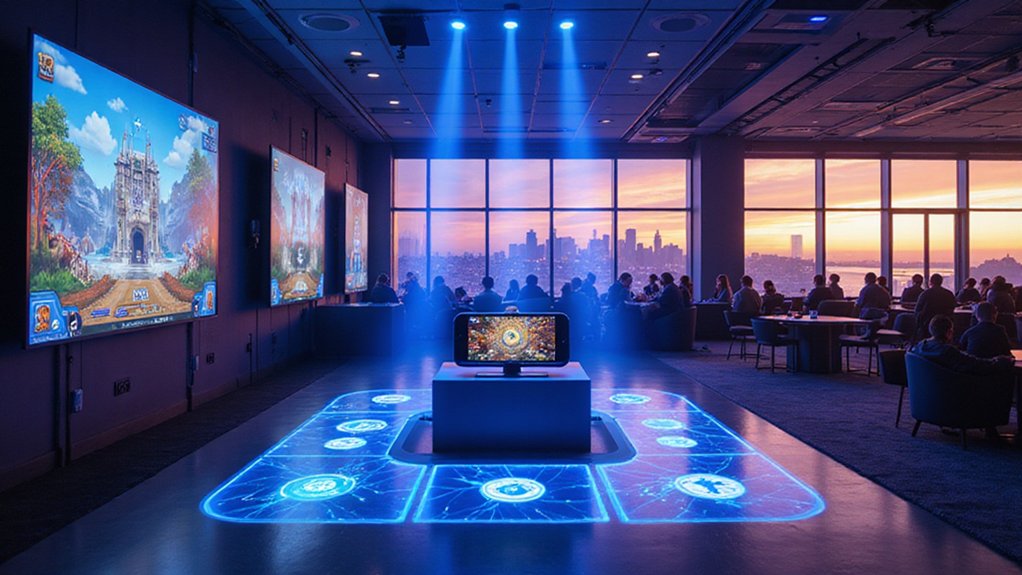The metaverse represents the convergence of physical and virtual realities into a continuous, immersive experience. Users navigate as avatars across interoperable platforms for social interaction, commerce, and entertainment. Major companies like Meta and Microsoft lead development, with projections indicating one billion active users by 2025. The global metaverse market is expected to reach $800 billion by late 2024, with 25% of people spending at least one hour daily in virtual environments by 2026. This digital evolution introduces both unprecedented opportunities and significant societal challenges.

The metaverse stands as the next frontier in digital evolution, merging our physical and virtual realities into a seamless, persistent experience. This expanding digital universe comprises shared virtual spaces accessible through virtual and augmented reality technologies, where users navigate as customized avatars. Industry analysts define the metaverse as a collection of interoperable platforms enabling social connections, commerce, and entertainment across a spectrum of virtual environments.
The technological infrastructure supporting the metaverse continues to mature rapidly. VR headsets and AR glasses serve as primary gateways, while artificial intelligence algorithms personalize user experiences and manage virtual environments. Blockchain technology underpins the metaverse economy, facilitating ownership of digital assets and enabling cryptocurrency transactions. The expansion of 5G networks and edge computing capabilities has significantly reduced latency issues that previously hindered immersive experiences.
AI and blockchain power the metaverse, while 5G and edge computing eliminate barriers to truly immersive digital experiences
By 2025, several major platforms have established dominant positions in the metaverse landscape. Meta's Horizon Worlds has evolved into a mainstream social platform, while Microsoft Mesh has transformed remote collaboration for enterprises. Gaming environments like Roblox and Fortnite continue attracting millions of daily users. Concurrently, blockchain-based worlds such as Decentraland have developed thriving virtual economies where digital real estate transactions exceed $2 billion annually. With one billion active users anticipated by 2025, the metaverse will fundamentally transform how people interact in digital spaces.
Economic forecasts project the global metaverse market will reach $800 billion by late 2024. According to Gartner Research, "By 2026, 25% of people will spend at least one hour daily in the metaverse for work, shopping, education, or entertainment." This digital migration has catalyzed new business models, with 70% of major brands now implementing metaverse marketing strategies and metaverse-related job postings increasing 400% since 2021.
Industries across sectors continue adopting metaverse technologies for practical applications. Educational institutions deploy immersive learning environments that improve student engagement and retention. Healthcare providers utilize virtual spaces for telemedicine consultations and therapeutic interventions. Retail brands create virtual storefronts where consumers can try products before purchasing physical counterparts. User motivation data shows that immersion and escapism are primary drivers of consumer interest, fueling the adoption across these diverse sectors.
Despite its promise, the metaverse presents significant challenges requiring attention. Questions regarding data privacy, digital addiction, and accessibility remain prominent concerns. Regulatory frameworks struggle to keep pace with rapidly evolving virtual economies.
Technical hurdles persist regarding interoperability between platforms, which limits seamless movement between different metaverse environments. As brain-computer interfaces and haptic technologies advance, questions of digital identity and consciousness will increasingly enter philosophical and ethical discussions surrounding this expanding digital frontier.
Frequently Asked Questions
How Much Will Metaverse Equipment Cost in 2025?
Metaverse equipment costs in 2025 are projected to follow a tiered pricing structure.
Entry-level VR headsets will likely range from $300-$600, while premium mixed reality devices may remain between $1,000-$3,500.
Accessories such as haptic gloves ($150-$400) and tracking systems ($200-$700) will complement the experience.
Virtual land purchases in popular platforms will continue to require significant investment, ranging from $1,000 to $10,000 depending on location desirability and platform popularity.
Can Children Safely Participate in the Metaverse?
Children's safe participation in the metaverse remains a double-edged sword.
While offering educational benefits and digital skill development, significant risks persist regarding inappropriate content exposure and privacy concerns.
Effective protective measures include robust parental controls, content filtering, and age verification systems.
Industry experts recommend: "Safety must be built into the foundation of child-focused virtual environments."
The ideal approach combines technological safeguards with parental oversight and balanced usage that integrates both virtual and real-world experiences for children's healthy development.
Will Traditional Social Media Platforms Integrate With the Metaverse?
Traditional social media platforms are actively integrating with the metaverse. Facebook/Meta leads with Horizon Worlds while Instagram investigates AR features for immersive experiences.
Twitter, LinkedIn, and Snapchat are also developing metaverse capabilities through 3D visualization, professional VR environments, and advanced AR technology respectively.
These integrations face significant challenges including interoperability concerns, complex content moderation in 3D spaces, and privacy issues.
Meanwhile, metaverse-native platforms like Decentraland and The Sandbox continue gaining traction with specialized social features.
How Is Metaverse Content Moderated and Regulated?
Metaverse content moderation employs multi-layered approaches combining AI systems, human oversight, and user reporting mechanisms. Real-time filtering technology screens offensive content while specialized AI detects inappropriate avatar movements and voice interactions.
Regulatory frameworks remain fragmented globally, creating challenges for consistent enforcement. Platform-specific policies establish behavioral standards, though critics argue for greater transparency.
Personal safety tools like blocking and customizable content filters provide individual protection. Industry leaders are developing cross-platform standards to address the unique nature of immersive interactions.
What Jobs Will Become Obsolete Due to Metaverse Technologies?
Several traditional roles face obsolescence as metaverse technologies advance.
Customer service representatives are being replaced by AI chatbots and virtual assistants, while data entry clerks are rendered redundant by advanced software solutions.
The retail sector faces significant disruption with traditional sales positions yielding to virtual shopping environments.
Travel agents and event planners are likewise at risk due to immersive virtual experiences.
According to Goldman Sachs, AI technologies could displace approximately 300 million jobs worldwide by 2030.
References
- https://www.insighttrendsworld.com/post/insight-of-the-day-metaverse-in-2025-what-users-want-and-what-s-holding-others-back
- https://www.sphinx-solution.com/blog/rise-of-metaverse-development-companies/
- https://www.digitallearninginstitute.com/blog/what-is-the-metaverse
- https://www.britannica.com/topic/metaverse
- https://percs.app/blog/metaverse-2025/
- https://www.techtarget.com/whatis/feature/The-metaverse-explained-Everything-you-need-to-know
- https://en.wikipedia.org/wiki/Metaverse
- https://www.femaleswitch.com/playbook/tpost/oxusicecz1-the-rise-of-metaverse-startups-trends-an
- https://www.rapidinnovation.io/post/what-is-the-metaverse-an-explanation-and-in-depth-guide
- https://www.techtarget.com/searchcio/tip/Top-metaverse-platforms-to-know-about


